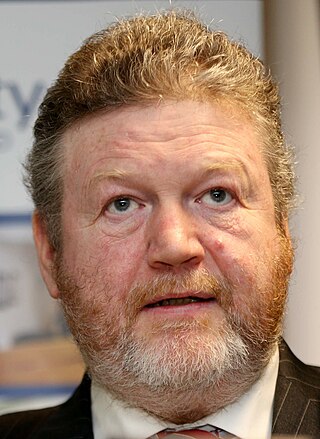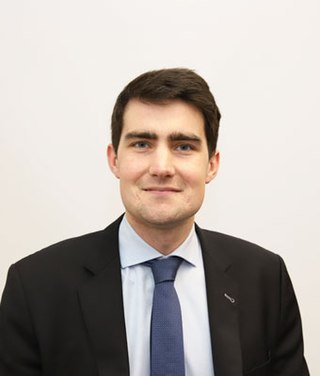Related Research Articles
Health care in Ireland is delivered through public and private healthcare. The public health care system is governed by the Health Act 2004, which established a new body to be responsible for providing health and personal social services to everyone living in Ireland – the Health Service Executive. The new national health service came into being officially on 1 January 2005; however the new structures are currently in the process of being established as the reform programme continues. In addition to the public-sector, there is also a large private healthcare market.

The Health Service Executive (HSE) is the publicly funded healthcare system in Ireland, responsible for the provision of health and personal social services. It came into operation on 1 January 2005.

Darragh O'Brien is an Irish Fianna Fáil politician who has served as Minister for Housing, Local Government and Heritage since June 2020. He has been a Teachta Dála (TD) for the Dublin Fingal constituency since the 2016 general election, and previously from 2007 to 2011 for the Dublin North constituency. He previously served as a Senator for the Labour Panel from 2011 to 2016.

James Reilly is an Irish former Fine Gael politician, businessman and medical doctor who served as a Senator from May 2016 to March 2020. He previously served as Acting Minister for Children and Youth Affairs from February to May 2016, Minister for Health from March 2011 to July 2014 and deputy leader of Fine Gael from 2010 to 2017. He was a Teachta Dála (TD) for the Dublin North constituency from 2007 to 2016. He subsequently announced his retirement from politics after he lost his bid for election for his old seat at the 2020 general election.
Cathal Magee was the Chief Executive Officer of the Health Service Executive (HSE) in Ireland from 2010 to 2012. He is also a non-executive director of insurance company Vhi Healthcare. Magee was born in County Cavan.

The Social Democrats are a centre-left, social-democratic political party in Ireland. Led by Holly Cairns, the party was launched on 15 July 2015 by three independent TDs, Catherine Murphy, and Róisín Shortall, and Stephen Donnelly. It promotes the Nordic model and pro-European views.

Jack Chambers is an Irish Fianna Fáil politician who has served as a Minister of State attending cabinet since July 2020, and served as Government Chief Whip from July 2020 to December 2022. He has been a Minister of State at various departments since June 2020. He has been a Teachta Dála (TD) for the Dublin West constituency since the 2016 general election.
The CervicalCheck cancer scandal first emerged in 2018 and involved several women in the Republic of Ireland suing the Health Service Executive (HSE) after they received incorrect smear test results for cervical cancer.
The Ireland East Hospital Group is one of the hospital groups established by the Health Service Executive in Ireland.
RCSI Hospitals is one of the hospital groups established by the Health Service Executive in Ireland.
William Gerard Anthony Holohan is an Irish public health physician who served as Chief Medical Officer of Ireland from May 2008 to 1 July 2022. Fergal Bowers described him as being "as familiar as Dr Anthony Fauci in the US and arguably as influential".

The COVID-19 pandemic in the Republic of Ireland is a part of the worldwide pandemic of coronavirus disease 2019 (COVID-19) caused by severe acute respiratory syndrome coronavirus 2 (SARS-CoV-2). In Ireland, it has resulted in 1,725,026 cases and 9,366 deaths.
Ronan Glynn is an Irish public health physician and physiotherapist who served as Deputy Chief Medical Officer of Ireland from October 2018 to May 2022. He previously served as Acting Chief Medical Officer of Ireland from July to October 2020, and was Head of the Health Protection Unit at the Department of Health.

The COVID-19 pandemic in the Republic of Ireland has had far-reaching consequences in the country that go beyond the spread of the disease itself and efforts to quarantine it, including political, educational and sporting implications.
Colm Henry is an Irish consultant geriatrician and Chief Clinical Officer of the Health Service Executive (HSE) since April 2018. He previously served as National Clinical Advisor and Group Lead for Acute Hospitals from 2014 to 2018, National Lead for the Clinical Director Programme from 2012 to 2014 and Clinical Director of the Mercy University Hospital, Cork from 2009 to 2012.

The COVID-19 vaccination programme in the Republic of Ireland is an ongoing mass immunisation campaign that began on 29 December 2020 in response to the COVID-19 pandemic in the Republic of Ireland. Ireland's vaccination rollout has been praised as one of the most successful rollouts in the world and was ranked number one in the European Union in terms of its percentage of adult population fully vaccinated, and was also ranked number one in the EU for the number of booster vaccines administered.

Saint Margaret's is a civil parish and townland in the historical barony of Coolock in County Dublin, Ireland. Rivermeade, a housing estate of 175 homes which is treated as a separate census town, is located between Saint Margaret's and the Ward River. Dublin Airport is also nearby.

On 14 May 2021, the Health Service Executive (HSE) of Ireland suffered a major ransomware cyberattack which caused all of its IT systems nationwide to be shut down.
The following is a timeline of the COVID-19 pandemic in the Republic of Ireland in 2022.
Bernard Gloster is an Irish public servant who has served as chief executive of the Health Service Executive since March 2023. He previously was chief executive of Tusla from 2019 to 2023, and before that chief officer of the HSE Mid-West.
References
- ↑ "HSE boss Tony O'Brien to step down over cervical cancer controversy". RTÉ News and Current Affairs. 10 May 2018. Retrieved 8 June 2020.
- 1 2 3 Shanahan, Catherine (12 June 2020). "HSE's Paul Reid on his prescription for success". Irish Examiner . Retrieved 10 July 2021.
- ↑ Deegan, Gordon (10 July 2021). "HSE chief Paul Reid's salary increases to €420,103". The Irish Times . Retrieved 10 July 2021.
- 1 2 "Fingal Council CEO Paul Reid named as new director general of HSE". RTÉ News and Current Affairs. 2 April 2019. Retrieved 8 June 2020.
- ↑ Ní Aodha, Gráinne (2 April 2019). "Paul Reid is the HSE's new director general". TheJournal.ie . Retrieved 8 June 2020.
- 1 2 3 "Speaker Spotlight: Paul Reid Chief Executive Officer, Health Service Executive". guaranteedirish.ie. Guaranteed Irish. 4 October 2019. Retrieved 8 June 2020.
- ↑ "Minister Simon Harris announces membership of Sláintecare Implementation Advisory Council". gov.ie. Government of Ireland. 3 October 2018. Retrieved 8 June 2020.
- ↑ McNeice, Stephen (2 April 2019). "Fingal Council Chief Executive Paul Reid appointed as new head of HSE". Newstalk . Retrieved 8 June 2020.
- ↑ "Paul Reid – Chief Executive Officer – Health Service Executive – LinkedIn". ie.linkedin.com. Retrieved 8 June 2020.
- ↑ Ring, Evelyn (8 July 2019). "Paul Reid wants to see 'more devolved' HSE". Irish Examiner . Retrieved 8 June 2020.
- ↑ McGee, Harry (15 June 2019). "Paul Reid has a record of delivering big projects. Can he tame the HSE?". The Irish Times . Retrieved 8 June 2020.
- ↑ Browne, Maureen. "Private sector would not do better managing the Irish health service". healthmanager.ie. Retrieved 8 June 2020.
- ↑ "Paul Reid – MacGill Summer School". macgillsummerschool.com. 2015. Retrieved 8 June 2020.
- ↑ "Taoiseach and Minister for Health announce the appointment of Mr Paul Reid as Director General of the Health Service Executive". gov.ie. Government of Ireland. 2 April 2019. Retrieved 8 June 2020.
- ↑ "Message from Paul Reid, Chief Executive of Fingal County Council #OurCouncilDay". facebook.com. 10 April 2018. Retrieved 8 June 2020.
- ↑ "HSE CEO Paul Reid delivers RCSI Leadership Lecture". rcsi.com. 7 November 2019. Retrieved 8 June 2020.
- ↑ Paul Reid [@paulreiddublin] (2 April 2019). "Feeling humbled, honoured & privileged to have been appointed as the DG, HSE @HSELive and working with a workforce and new board, hugely committed to health care. Leaving Fingal @Fingalcoco with a heavy heart but proud of the staff & the citizens we serve" (Tweet) – via Twitter.
- ↑ "Council chief to leave for the HSE". Fingal Independent. Irish Independent. 6 April 2019. Retrieved 8 June 2020.
- ↑ "HSE chief executive Paul Reid stepping down". RTÉ News and Current Affairs. 27 June 2022. Retrieved 27 June 2022.
- ↑ McCarron, Jamie (30 September 2022). "Paul Reid finishes last day as CEO of the HSE". TheJournal.ie . Retrieved 30 September 2022.
- ↑ "Paul Reid to chair Citizens' Assembly on drugs use". RTÉ News. 28 February 2023.
- ↑ Carter, Erica (28 June 2022). "Inside Paul Reid's family life with childhood sweetheart Margaret and two grown up children". RSVP Live . Retrieved 26 December 2023.